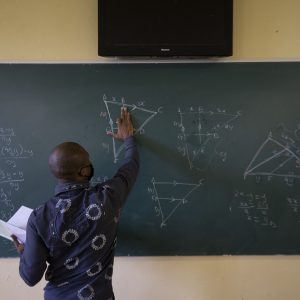Government neglects children with additional needs
The Nofezile Special Care Centre creates jobs and cares for children with physical and mental health impairments, but it does so in a hand-to-mouth way, limiting its potential.
Author:
17 May 2021

The Nofezile Special Care Centre in Qonce, Eastern Cape, not only fills an important gap in a marginalised sector of the country’s education system but also creates employment opportunities.
The poorly resourced school for children with physical impairments and learning difficulties was built in honour of and named after Nofezile Bhele, who died in 2003. Bhele established the Masincedane Disability Centre in 1994, but it closed in 2014 because of a lack of staff.
Seeing the importance of the work Bhele had done, Abongile Menye, 34, founded the new centre for children with additional needs in 2016. It operates from the same building as its predecessor and Menye says she named the centre after Bhele because “she [Bhele] wanted to improve the lives of children with disabilities”.
Related article:
In addition to education, “we ensure that children properly take their medication. We massage them to help relax their muscles. We give them love and care,” says Menye.
Developmentally impaired children are taught skills such as beading, sewing and operating a computer. “We do this to improve their lives because once they reach 18 years old, we discharge them from the centre. The acquired skills will help them to be independent,” says Menye.

Some of the activities at the centre include colouring in, storytelling, and throwing-and-catching. Because of the coronavirus pandemic, children are also taught about sanitising and other health protocols.
Inner workings
The centre looks after 30 children between the ages of six and 18. The monthly fee for each child is R800. The Department of Social Development in the Eastern Cape gives the centre a conditional grant for nutrition of R9 000 every three months. This grant covers 20 children as that’s the number of children the centre had when Menye applied for funding.
The centre has 10 staff members: a gardener, two security guards, four caregivers, two cooks and an administrator. There are also three volunteers. The department pays the salaries of two of those staff members, one cook and one caregiver. The others, including the volunteers, are paid from the R800 tuition fees the parents pay. These fees also help with maintaining the centre.
Related article:
Olona Lam, 28, describes her role as that of an all-rounder, doing a bit of everything from administration to gardening and caregiving. “I am an administrator. But here at Nofezile, we work as a team,” says Lam.
Menye says she would like the centre to receive training in first aid, financial management and project management, as well as training for the caregivers.

“My challenge as an administrator, I struggle with office equipment,” says Lam. “We struggle with things like email and fax. We are in desperate need of training for caregivers. Training will expand our knowledge and assist in our work.”
Water challenge
The centre’s taps ran dry in July last year. The staff have asked their ward councillor for help, but Menye says there are always delays and that has forced the centre to use its meagre resources to buy water. “We pay R1 000 to purchase 1 000 litres for the water tank, because children need to be washed twice a day, for example,” she says.
Despite the challenges they face, “I love working at the centre,” says Lam.
The centre has created work opportunities for the volunteers, says Menye, who would like to see these students housed there as well. This is not possible at the moment because the building is dilapidated. As a result, four children sleep at one caregiver’s house. Others travel to and from home in the centre’s vehicle. Because the facility is too small, Menye says, it can’t admit more children.
The centre has a garden in which community members and volunteers work alongside the gardener to keep the plants alive. “The vegetables [from the garden] help us a lot in providing food for children at the centre,” says Menye.
The fresh produce also raises funds through sales of the potatoes, spinach, onions and cabbages that are cultivated.
The Ikhala Trust helps with training. The trust describes this as community development that “focuses attention on the strengths and capacities that communities and organisations already have and builds from there – surfacing hidden strengths and growing a common vision from which to move forward.”
“The Ikhala Trust has greatly assisted in preventing Nofezile from collapsing,” says Menye.
Short on funds
Menye is part of the Eastern Cape Cluster of Special Care Centres. Sindisiwe Datini, 55, is the chairperson of the non-profit organisation, which launched in 2014 and has 52 members from eight districts in the province.
“The aim is to advocate, share ideas and mobilise for the rights of children and youth with intellectual impairment. Members of the organisation care for approximately 867 children and youth with severe and profound intellectual impairment,” says Datini.
The sector for children with physical and mental health impairments in the Eastern Cape has many problems, including a lack of funds. This means centres receive little support for nutrition and transport, which are important as many of the children’s parents are unemployed. Poor collaboration between the Department of Social Development and the Department of Education makes things even more difficult.
“We need our government to take children with severe and profound intellectual disabilities seriously in terms of funding,” says Datini.







